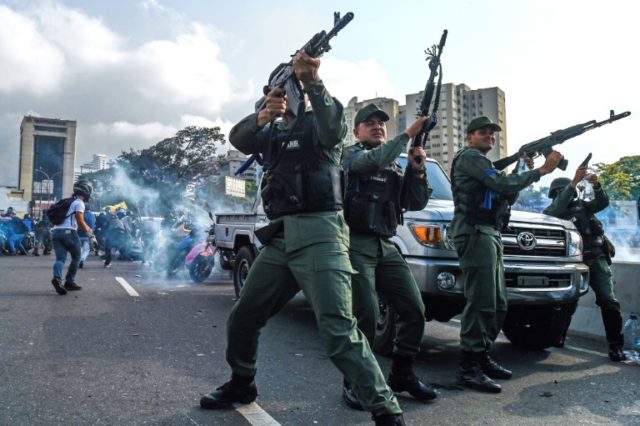Distrust, alarm, and confusion have consumed the Venezuelan Armed Forces in the wake of President Juan Guaidó’s announcement last week that the military had agreed to abandon dictator Nicolás Maduro, the Spanish newspaper ABC reported Sunday.
Guaidó, who legally became president of Venezuela in January but has yet to exercise his right as commander in chief because Maduro retains control of the leadership of the armed forces, appeared at an airbase outside of Caracas last Tuesday at dawn declaring that the troops had finally agreed to fall under his command. He asked civilians to flood the military installations near them in a sign of support to the soldiers brave enough to publicly defy the Maduro regime. What ensued were peaceful rallies of anti-socialist protesters nationwide followed by Maduro loyalists violently repressing them, running protesters over with armored vehicles and shooting at least four to death.
Maduro’s military leadership responded to Guaidó by declaring their loyalty and ordering a series of ceremonial events to show the world that the troops were united behind Maduro. Behind the scenes, however, soldiers are reportedly bitterly divided and unsure of who to trust, as any soldier may secretly support the opposing faction.
“We live a very complex and confusing situation,” an unidentified “high-ranking military source” told the Spanish newspaper ABC. “We have to take firm and sure steps in here, nobody is anybody’s friend in the military.”
Venezuelan journalist Sebastiana Barráez told the newspaper that she believes the uprising left Maduro in a vulnerable situation. While Guaidó has yet to succeed in taking full reins of the military, he exposed the internal divisions within the armed forces and significantly hurt its ability to coordinate, as the soldiers are not sure who is loyal to Maduro and who isn’t. Barráez called Maduro’s response to the uprising a “great failure.”
On Sunday, the Venezuelan news outlet Runrunes echoed the ABC report, suggesting that Venezuelans civilians also believe the tide has shifted against Maduro in his armed forces. Of Maduro’s efforts to produce propaganda claiming the troops are united, journalist Nelson Bocaranda wrote, “These images alone cannot change the perceptions that exist in the population that the same malaise that exists among civilians also pervades the military.” He noted that Maduro significantly inflated the number of troops that he had gathered for a unity event this weekend.
Maduro nonetheless plastered the images across his Twitter profile, and videos showing young recruits pledging allegiance to him.
En nuestros jóvenes cadetes de la Universidad Militar Bolivariana, está la generación patriota del tricentenario, que verá a la Revolución Bolivariana consolidada en la Venezuela Potencia que estamos construyendo. pic.twitter.com/LCsr5sfrTu
— Nicolás Maduro (@NicolasMaduro) May 5, 2019
“Be ready to defend the country with weapons in your hand if one day the United States empire dares touch this territory, this sacred land,” Maduro told soldiers on Sunday at an event at a northeast military base. “I tols the generals and admirals yesterday: loyalty, I want active loyalty … I trust you, but keep your eyes open.”
In April, weeks before his call to take the streets last week, Guaidó claimed that he was having “very discreet conversations” with military leaders to discuss removing Maduro. On Tuesday, he suggested that there existed a critical mass of soldiers willing to defect.
“People of Venezuela, it is necessary that we go out to the street today, to back democratic forces and recover our freedom,” Guaidó said. “Organized and together, move to the [country’s] main military units. People of Caracas, come to La Carlota.”
By Sunday, however, he admitted to the Washington Post that he may have overestimated the enthusiasm in the military to face a change in leadership that may result in soldiers facing justice for human rights abuses committed under Maduro’s orders.
“Maybe because we still need more soldiers, and maybe we need more officials of the regime to be willing to support it, to back the constitution,” Guaidó told the newspaper, speculating as to why Maduro had not fled the country. “I think the variables are obvious at this point.”
“I think today there are many Venezuelan soldiers that want to put an end to [leftist guerrillas], and help humanitarian aid get in, who would be happy to receive cooperation to end usurpation. And if that includes the cooperation of honorable countries like the United States, I think that would be an option,” he added, suggesting he would consider a U.S. military role in eradicating the Maduro dictatorship.
While Guaidó could not yet count on Defense Minister Vladimir Padrino to abandon Maduro, several high-ranking soldiers did defect last week. Highest among them was the director of the nation’s intelligence bureau and secret police, known as SEBIN,
Manuel Ricardo Cristopher Figuera. Cristopher resigned last week and published an open letter insisting he was not a traitor, but could no longer serve Maduro given the devastating situation in the country under his rule. Days later, Venezuelan outlets began circulating accusations by Cristopher on who is responsible for Maduro’s choice not to step down. High atop his list of culprits are Maduro’s top two subordinates: Diosdado Cabello, the second-in-command notorious from running a drug smuggling ring within the military, and Tareck El Aissami, believed to be Hezbollah’s top recruiter in the Western Hemisphere. Cabello and Aissami, rumored to be in a years-long power struggle against each other, helped convince Maduro to stay, Cristopher has reportedly argued.

COMMENTS
Please let us know if you're having issues with commenting.